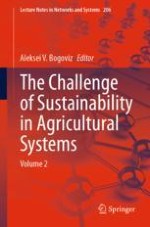2021 | OriginalPaper | Buchkapitel
The Effectiveness of Developing Branches of the Agricultural Sector in Peasant (Farm) Enterprises
verfasst von : Svetlana S. Sushentsova, Tatyana A. Bayer, Nina I. Litvina
Erschienen in: The Challenge of Sustainability in Agricultural Systems
Aktivieren Sie unsere intelligente Suche, um passende Fachinhalte oder Patente zu finden.
Wählen Sie Textabschnitte aus um mit Künstlicher Intelligenz passenden Patente zu finden. powered by
Markieren Sie Textabschnitte, um KI-gestützt weitere passende Inhalte zu finden. powered by
